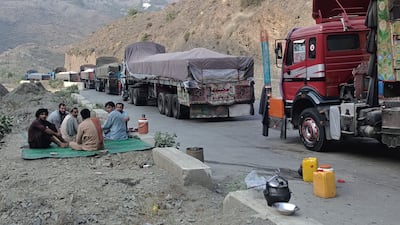The main border crossing between Afghanistan and Pakistan reopened after nine days on Friday, bringing relief to travellers and traders.
Pedestrians and vehicles resumed using the Torkham gateway after talks between the two neighbouring countries.
The 2,600km border between the two countries was closed on September 6 after a gun battle between frontier guards over the construction of a checkpoint.
The latest incident came after a deadly cross-border attack by militants on Pakistani outposts in the Chitral district on September 6.
Syed Anwar, a 45-year-old driver who was stuck with his maize-laden truck for several days, told The National that he was happy to continue his journey amid the scorching heat in the rugged area of the Khyber tribal district.
However, he was concerned about his health as he had caught a fever.
“In the night we suffered mosquito bites, while during the day we suffered the heat of the roads under the scorching sun," he said.
Like Mr Anwar, thousands of drivers and their helpers faced problems as they were stranded with their goods-laden trucks.
Muhammad Noor Ahmedzai, president of the Pak-Afghan Transporters Association, told The National that about 1,300 vehicles carrying various commodities had been stuck at the border.
“We appeal to both governments not to shut the border because of political issues. Trade should not be sacrificed as it is a source of livelihood for tens of thousands,” said Mr Ahmedzai, who hails from the Logar province of Afghanistan.
“The vegetables and fruit perished in numerous vehicles. Some drivers on the Afghan side were able to sell the perishable commodities at throwaway prices through auctions. But many suffered losses.”

A Pakistan Customs official said the border closure caused losses worth tens of millions of rupees to the government.
“Revenue collection in terms of taxes on imports and exports stands at approximately Rs10 million on a daily basis,” he added.
He said that immigration and security personnel have now received orders to resume their duties at Torkham.
Ziaul Haq Sarhadi, director of the Pak-Afghan Joint Chamber of Commerce and Industry, said the impasse resulted in losses of about $3 million for business owners due to the destruction of perishable items, including fresh fruits, vegetables, poultry, meat, eggs, and juices.
More than 1,500 lorries were stranded in queues on both sides of the border, he added.
“Every day, about 150 to 200 trucks of soapstone and 100 trucks of coal arrive in Pakistan from Afghanistan, while a large number of trucks cross the border into Afghanistan, carrying export goods like cement, structural iron, poultry, meat, eggs, bananas, and potatoes,” he said.
He said that Pakistan’s exports to Central Asian countries also through Afghanistan, and the border closure not only affected bilateral trade but also regional trade.

